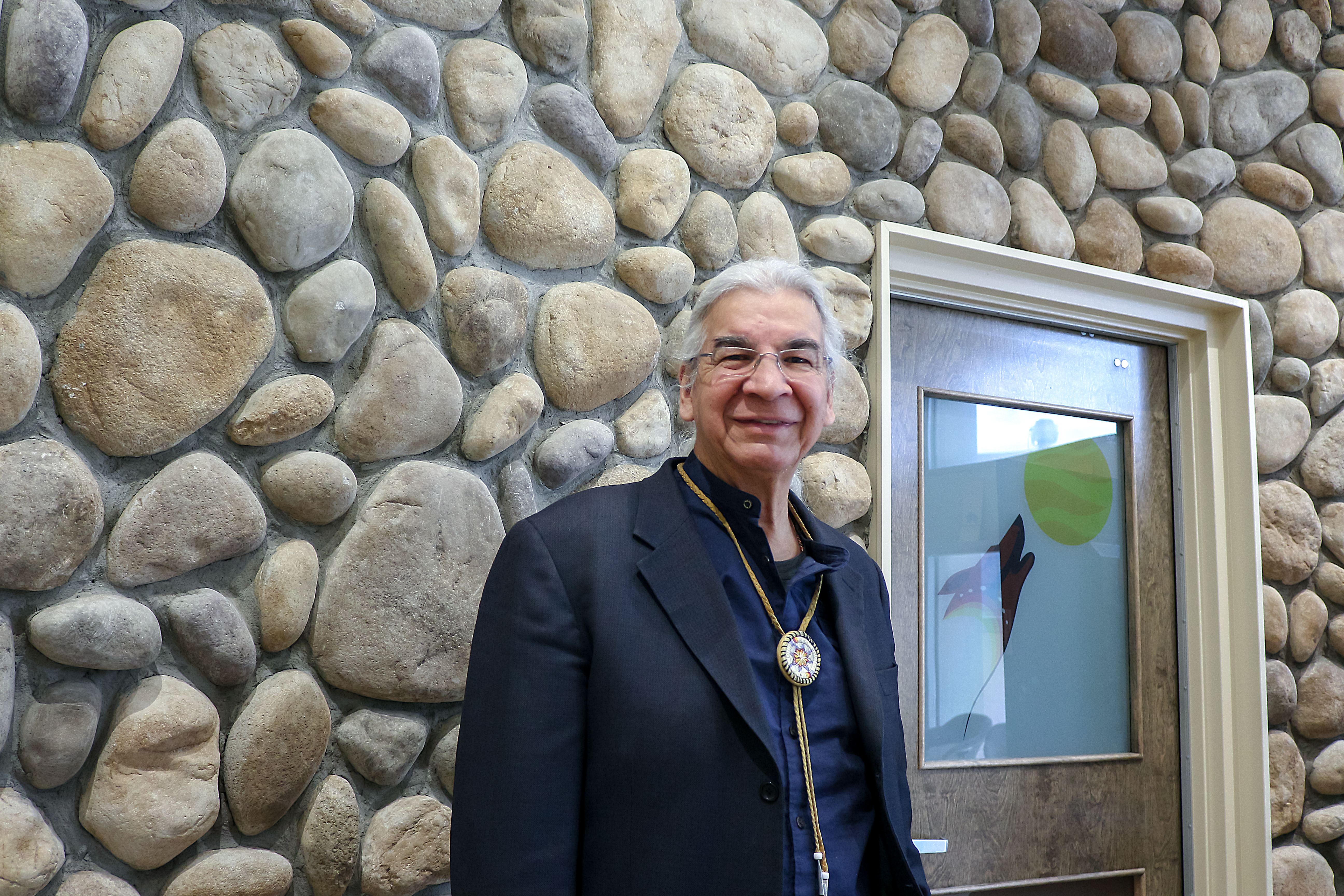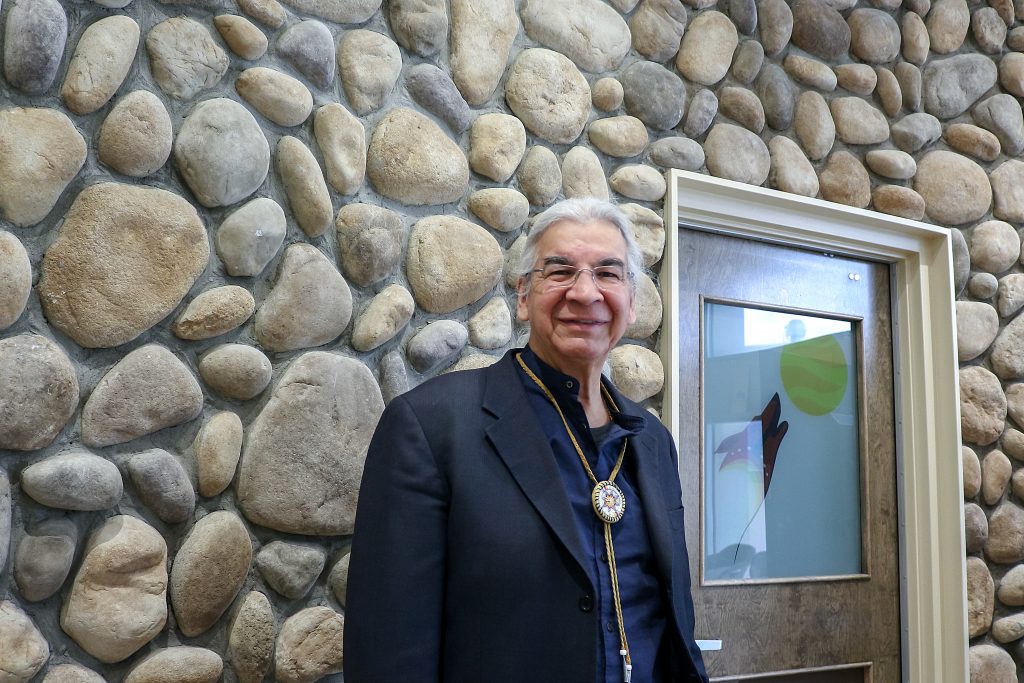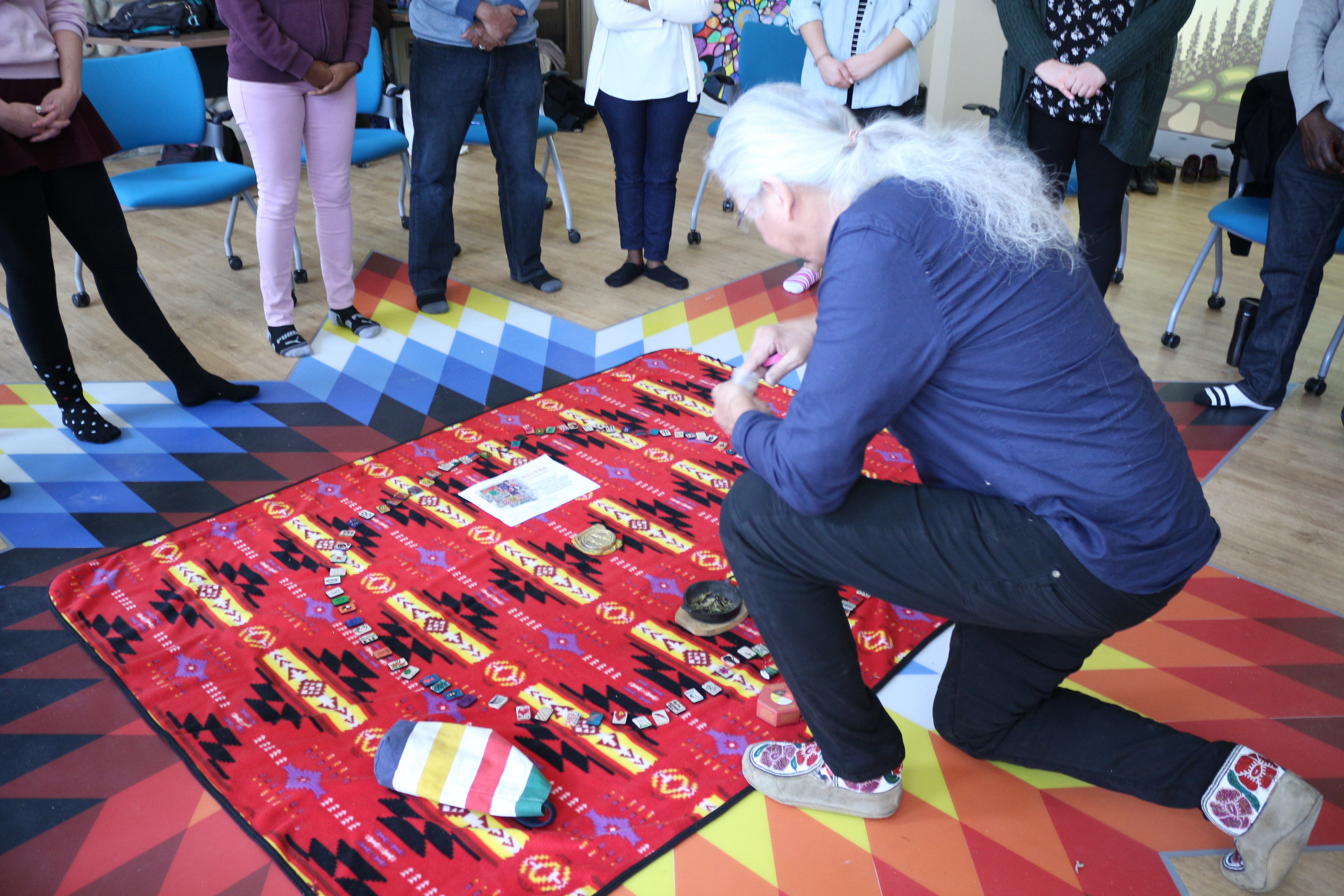 In October 2018, the Faculty of Education’s emerging Elder in Residence, Joseph Naytowhow, a Plains/Woodland Cree (nêhiyaw) singer, songwriter, storyteller, actor, and educator from the Sturgeon Lake First Nation in Saskatchewan, was recognized by the Saskatchewan Arts Board with an award for his contributions to arts and learning. Naytowhow says this award is significant to him, attributing the recognition to “the children and the people I work with, the teachers, and educators, and I share this award with them.”
In October 2018, the Faculty of Education’s emerging Elder in Residence, Joseph Naytowhow, a Plains/Woodland Cree (nêhiyaw) singer, songwriter, storyteller, actor, and educator from the Sturgeon Lake First Nation in Saskatchewan, was recognized by the Saskatchewan Arts Board with an award for his contributions to arts and learning. Naytowhow says this award is significant to him, attributing the recognition to “the children and the people I work with, the teachers, and educators, and I share this award with them.”
This isn’t the first award for Naytowhow, whose work has been recognized by several awards: the 2006 Canadian Aboriginal Music Award’s Keeper of the Tradition Award, a 2005 Commemorative Medal for the Saskatchewan Centennial, the 2009 Gemini Award for Best Individual or Ensemble Performance in an Animated Program or Series for his role in Wapos Bay, the 2009 Best Emerging Male Actor at the Winnipeg Aboriginal Film Festival for his role in Run: Broken Yet Brave and the Best Traditional Male Dancer at the John Arcand Fiddle Fest.
Naytowhow says he appreciates the awards he receives from Saskatchewan, valuing them as “gifts that validate that I have needed both worlds. They’re inseparable.” He considers the awards, as “marking posts in my life that indicated to me that I was someone who had something to share, —I think it validated what I was doing in the spiritual and cultural worlds: nêhiyaw (Cree person) and nêhiyawêwin (speaking Cree), practicing nêhiyaw-isîhcikêwin (Cree culture and ceremony). All I was doing was Indigenous ceremony and culture because that was my life force, my life source.”
At the same time it is difficult to receive the awards because, for Naytowhow, art was never about recognition. He says, “Sometimes you don’t believe it when you’ve been given an award because it’s come from the place that you’ve suffered through and healed through…Everything that I did was about healing. Returning to balance. Everything was about that.”
Naytowhow has invested a lifetime in healing from the trauma of being taken from his family and community at the age of 6, and placed in Indian residential schools for the next 13 years.
“What I went through is one thing, right, 13 years of residential school, is one thing, but you never really understood what you were experiencing academically in education. It didn’t make sense. I didn’t come from that world. I didn’t come from Shakespeare; I didn’t come from math, or from overseas, and yet I was totally immersed in that, and just totally struggled to get through it every step of the way.”
When Naytowhow graduated from highschool, it wasn’t due to academic achievement: “It was like a bull dozer going through a big mud pile, just edging along. I finally got pushed out of that system with a fifty average. I think they just wanted to get me finished. I was really a below average student according to my marks. I was really a very silent learner and you can’t be a silent learner in this system; you have to speak, you have to present, you have to do it their way. And it never really resonated with me,” he says.
After residential school, Naytowhow spent his youth in search of himself. His search for harmony and balance began with attempting to live in the colonial culture. Knowing that education was important to earn a living, Naytowhow, who enjoyed athletics, found a physical education program at a university in Calgary that would accept him with his grades. The program was more about physical performance than academics, and, Naytowhow says, “I did really well; it was all based on skill. I excelled and the first semester my marks were good so I immediately applied to the U of R.” Naytowhow was accepted into the Faculty of Education, but struggled through the next three and a half years before withdrawing from the program. “I was still trying to make sense of this culture that was imposed on me and I sort of got it, but I sort of didn’t. I just barely squeezed by. … I would try to read and I would read for a while and I would fall asleep. I was reading some scientific theory and my mind wanted to write a poem,” he says.
However, after withdrawing from the education program, and while he was working as an Education Liaison for the Friendship Centre, Naytowhow realized that without a degree he wasn’t being taken seriously by the educational administrators, so he decided to finish his Education degree, but this time through ITEP {Indian Teacher Education Program) at the University of Saskatchewan. His practicum took him north to Stanley Mission, to a federally funded school. Naytowhow graduated with a B.Ed., but he didn’t stay in the teaching position he acquired due to a lack of support from the administration.
As Naytowhow continued his search for fulfillment and self, he drifted from job to job, moving from the North to the South, to the further north (NWT) and then back again, trying to fit into the protestant work ethic of 9 to 5 work: “There was something about my experience at residential school that affected my ability to, not so much retain jobs, but stay in a job for any longer than two years. For some reason it was the limit of my mind and body. So I would move; I would want to move: miskâsowin (finding oneself), and opapâpâmacihôs, (moving about in life), that searching for oneself. I wasn’t really fulfilled in the position I was doing. So I would just resign and take off.”
Having children made life a more serious affair and Naytowhow did what he could as a parent to try to maintain stability. He says, “I started being a father and looking after my kids as much as I could within the kind of terrible child rearing that I got through residential school. Some was good, you know; it wasn’t all bad, but it was basically being parented by surrogate parents who didn’t—who couldn’t really take the time to train you to be a young man, a responsible young male, or human being. They just didn’t have time. There was no way they could raise me like a son. So I was trying to raise my own kids from a place of no parenting skills, not learning how to be intimate, not even knowing if I could maintain a job. …. But all along, I really was not feeling fulfilled as a human being, as a male, as a man. I wasn’t being all that society requires for one’s life to be in harmony and in balance, like having the 9 to 5 job, or having a steady income. It happened but it didn’t really make any sense to me.”
What did make sense, what always made sense to Naytowhow, was culture and ceremony: “Singing with the elders or praying with the elders, that was what made sense to me, of anything I was experiencing. The Canadian culture, the protestant work ethic, just didn’t make any sense to me.”
All through his healing journey, Naytowhow was developing an awareness of his Indigenous roots, what he had left behind at the age of 6, the lost memories of loving relationships and experiences with family members and his community. It started first with a realization in his 20s that he was Indigenous (not Canadian as he had been taught), and then the gradual addition of Indigenous culture and ceremony to his life.
While attending the University of Regina, Naytowhow picked up a drum for the first time: “I had a strong urge to go to the drum. I never looked back, ever since I hit that drum.” A visiting visual arts professor from the state of Washington, Leroy of the Yakama tribe, and a colleague, Tim of the Umatilla tribe, introduced him to the drum: “From there,” Naytowhow says, “I went into powwow, into the Sundance, into all the other ceremonies connected through a drum. The drum moved me into the sacred music and songs, and that totally made sense for me to do.”
Naytowhow explains: “My soul was calling out, was being called out, to the elders and ceremonies; that was where I was supposed to be; that was supposed to happen, and I absolutely totally trusted that intuitively.”
“The gifts of music and song and stories that I got from the elders, those were the most critical and most important [awards] that I needed to keep this being alive on this planet. Cause when you’ve gone through residential school, you’ve got extreme trauma that you have to deal with and its always going to be there. Even to this day I still experience pockets of anger and depression and just dark holes that I can’t make sense of, but those stories, or ceremonies, or laughter, anything to do with that, I just had to be there, I had to go there.”
The wisdom of age and experience has given Naytowhow the understanding that “what went wrong, when I went into the colonization culture, was that I tried to be a part of it 100%. I just had to be in and out of it. Had to find short term work and depend on that. That’s probably why I became more a musician and storyteller, became an artist. It was far more flexible and fulfilling as a singer, as someone fascinated by story and fascinated by culture, and I slowly got into acting. For me, I could live there.”
The first time Naytowhow began to consider himself a practicing artist was when he started a residency in Meadow Lake as a storyteller, between 1995 and 2000. He then thought, “Ok, now I can make a living being an artist, being a musician, putting out an album now and then, travelling to storytelling festivals, to music festivals.” His healing journey became the source, he says, “whereby my art practice would flourish and my cultural and spiritual practice. Healing was more a spiritual and cultural journey, more that part, and the art kind of came out of it as a result.”
The Saskatchewan Arts Board Award came with $6000, which is something Naytowhow really appreciates because it allows him to focus on his art: “As an artist, I just need to do the art. But I can’t do it when I’m doing presentations in different areas and being pulled all over. What I need is just some financial support to pay bills and pay my rent. And then I can do songwriting…the things that I do anyway, but I’ve never really been focused as an artist.”
Naytowhow’s healing journey, reconnecting with Indigenous culture and ceremony, and expressed through the arts and education, keeps him connected to both worlds. His presentations begin with Cree concepts, and he relies on the wisdom of the old people to guide him as he educates students. The balance and harmony he has found reflects his Indigenous name, which means “guided by the spirit of the day.”
By Shuana Niessen
Follow us on social media


